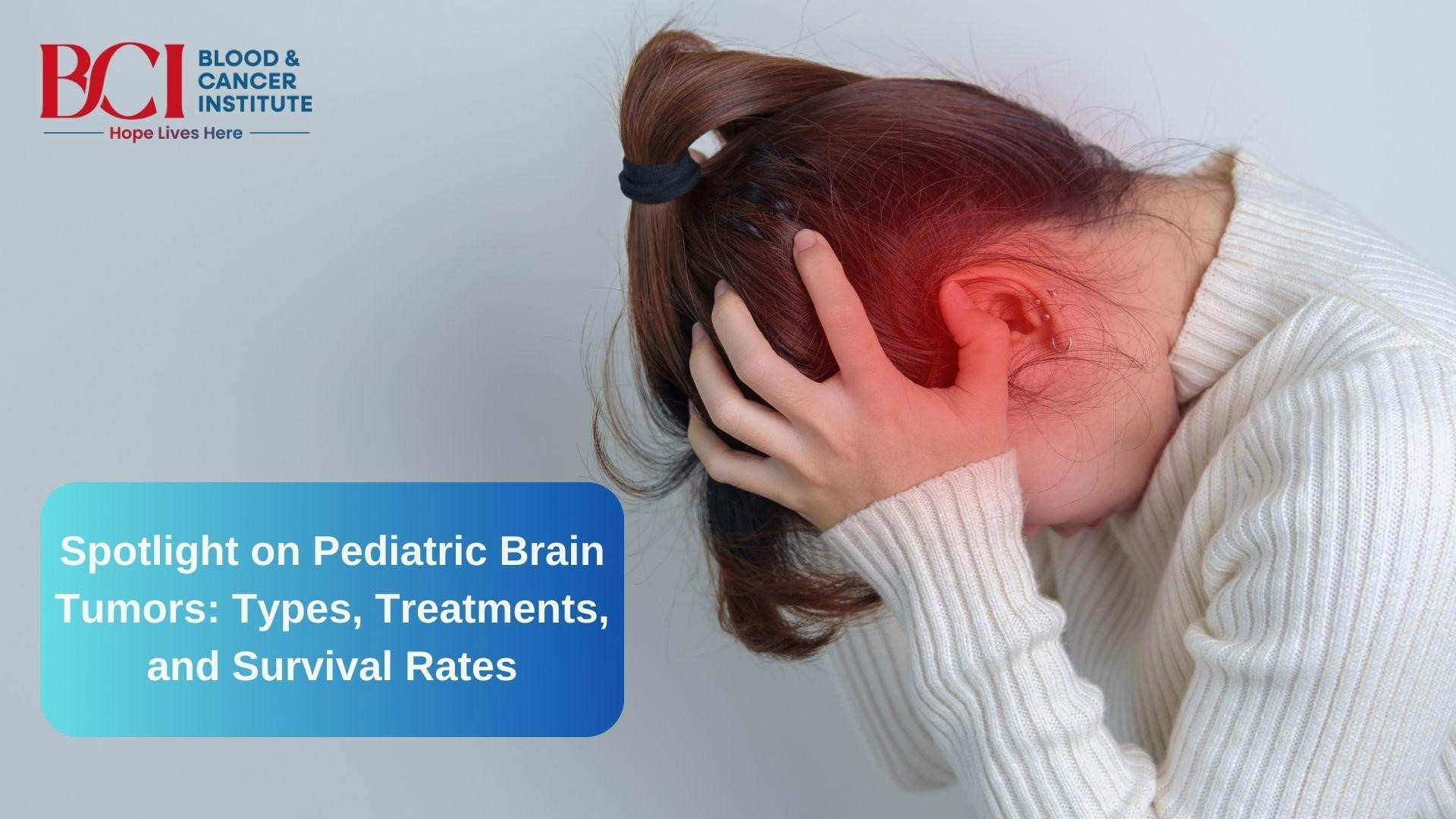
- By : BCI
- General
- Comments: 0
Spotlight on Paediatric Brain Tumours: Types, Treatments, and Survival Rates
Paediatric brain tumours, though relatively rare, represent one of the most devastating forms of cancer affecting children in India and worldwide. At Blood and Cancer Institute, our team of paediatric cancer specialists in Surat, understand the unique challenges and complexities involved in diagnosing and treating these tumours in young patients.
Brain tumours in children can arise from various types of cells within the brain or surrounding tissues. While some tumours may be non-cancerous (benign), others can be malignant (cancerous) and potentially life-threatening. Understanding the different types of paediatric brain tumours is crucial for determining the most effective course of treatment and improving survival rates.
Types of Paediatric Brain Tumours
1. Astrocytomas: These tumours originate from star-shaped cells called astrocytes, which play a supportive role in the brain. Astrocytomas can range from low-grade (slow-growing) to high-grade (aggressive) tumours.
2. Medulloblastomas: Commonly found in the cerebellum (the part of the brain responsible for balance and coordination), medulloblastomas are highly malignant tumours that can spread to other parts of the brain and spinal cord.
3. Ependymomas: These tumours develop from ependymal cells lining the ventricles (fluid-filled spaces) and the central canal of the spinal cord. Ependymomas can occur in various parts of the brain and spinal cord.
4. Gliomas: Gliomas are tumours that arise from glial cells, which provide support and protection for neurons in the brain. They can be further classified as low-grade or high-grade gliomas, depending on their aggressiveness.
5. Craniopharyngiomas: Cancer specialists in Surat say that these rare, non-cancerous tumours that develop from cells near the pituitary gland, which is responsible for producing important hormones that regulate growth and development.
Treatments for Paediatric Brain Tumours
At Blood and Cancer Institute, one of the best cancer hospitals in Surat, our multidisciplinary team of specialists collaborates closely to develop comprehensive treatment plans tailored to each child’s unique needs. The treatment approach may involve one or more of the following:
1)Chemotherapy: Various chemotherapy drugs may be used to shrink or control the growth of brain tumours, either alone or in combination with other treatments.
2. Radiation Therapy: Precision radiation techniques, such as intensity-modulated radiation therapy (IMRT) and proton therapy, can target the tumour with high doses of radiation while sparing nearby healthy tissues.
3. Targeted Therapy: Newer therapies target specific molecular pathways or genetic mutations involved in tumour growth, offering a more personalized approach to treatment.
4. Supportive Care: Our team of paediatric cancer specialists in Surat lays importance on providing comprehensive supportive care services, including physical therapy, occupational therapy, and psychological support, to help children and their families cope with the challenges of diagnosis and treatment.
Survival Rates and Long-Term Outlook
The prognosis for paediatric brain tumours varies depending on several factors, including the type and location of the tumour, the extent of surgical resection, the child’s age, and the overall health status. “Early detection and timely intervention play a crucial role in improving survival rates and long-term outcomes”, say the experts giving cancer treatment in Surat.
According to data from the Indian Council of Medical Research (ICMR), the overall 5-year survival rate for paediatric brain tumours in India is approximately 60–70%. However, survival rates can vary significantly based on the tumour type and other factors.
For example, the 5-year survival rate for low-grade astrocytomas is generally higher, ranging from 80–90%, while the rate for aggressive tumours like medulloblastomas and high-grade gliomas can be lower, ranging from 50–60%.
At BCI, one of the best cancer hospitals in Surat, we remain committed to providing cutting-edge treatments and personalized care to improve survival rates and quality of life for children with brain tumours. Our dedicated team of specialists works tirelessly to advance research, develop new therapies, and offer hope to families facing this challenging diagnosis.
Ongoing Support and Follow-Up Care
Even after successful treatment, children who have battled brain tumours often require ongoing support and follow-up care to address potential long-term side effects and complications, says our cancer specialist in Surat at BCI- Blood and Cancer Institute. These may include cognitive impairments, hormonal imbalances, vision or hearing problems, and secondary cancers.
Our hospital’s comprehensive follow-up program ensures that children receive regular monitoring, rehabilitation services, and psychosocial support to help them thrive and achieve their full potential. We also provide education and resources for families to empower them in navigating the journey of survivorship.
Conclusion
While paediatric brain tumours present significant challenges, advancements in medical science and the dedication of paediatric cancer specialist in Surat at hospitals like BCI offer hope for better outcomes. By raising awareness, supporting research efforts, and providing compassionate care, we can make a difference in the lives of children affected by these complex and often devastating conditions.
